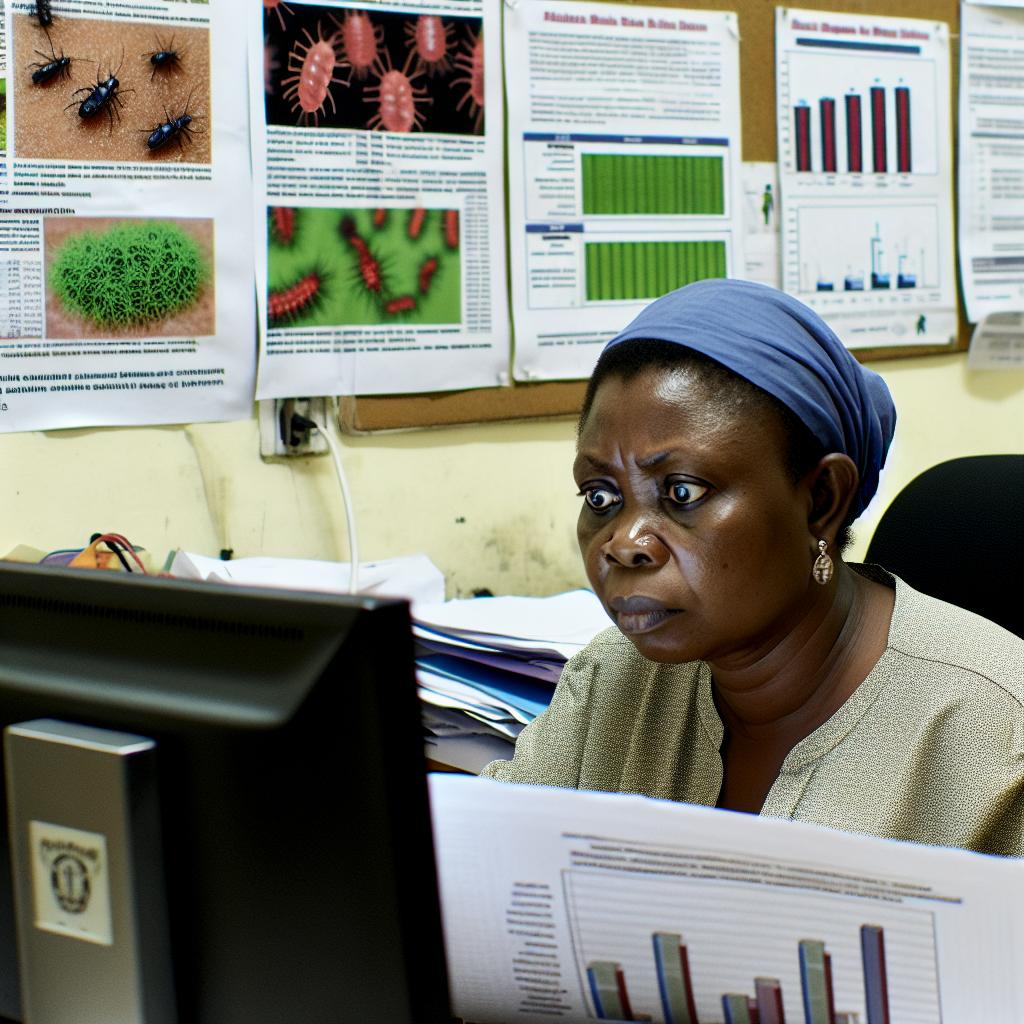Introduction
Parasitic diseases in Nigeria are greatly influenced by climate conditions.
Understanding this relationship is crucial for maintaining public health in the country.
Climate change has been shown to directly impact the prevalence and distribution of parasitic diseases.
For instance, rising temperatures and increased rainfall can create favorable conditions for the breeding of mosquitoes.
These are vectors for diseases like malaria and lymphatic filariasis.
Such diseases are major public health concerns in Nigeria.
They can lead to significant morbidity and mortality if not properly managed.
By studying the impact of climate on parasitic diseases in Nigeria, public health officials can better anticipate outbreaks.
They can implement targeted interventions to control the spread of these diseases.
Such interventions may include vector control measures, mass drug administration campaigns, and health education programs.
All of which are essential for reducing the burden of parasitic diseases and improving overall health outcomes in Nigeria.
Overview of parasitic diseases in Nigeria
Background: Nigeria is known to have a high burden of parasitic diseases.
Prevalence: Common parasitic diseases include malaria, schistosomiasis, and soil-transmitted helminths.
Impact: These diseases contribute significantly to morbidity and mortality rates in the country.
Impact of parasitic diseases on the population
-
Malaria: It is a leading cause of illness and death, especially in children under five years old.
-
Schistosomiasis: Negatively affects growth, cognition, and school attendance in affected populations.
-
Soil-transmitted helminths: Can lead to malnutrition, anemia, and impaired cognitive development in children.
-
Economic burden: Parasitic diseases result in increased healthcare costs and reduced productivity in Nigeria.
-
Social impact: Stigma and discrimination are associated with some parasitic diseases, affecting individuals’ quality of life.
-
Public health challenges: Lack of access to clean water and sanitation facilities worsens the spread of parasitic diseases.
Climate factors influencing parasitic diseases
Temperature and rainfall impact transmission of parasitic diseases.
Climate change alters disease patterns and distribution.
Climate plays a significant role in the transmission and distribution of parasitic diseases in Nigeria.
Various climate factors such as temperature and rainfall can influence the prevalence and spread of these diseases.
Understanding how climate change affects parasitic diseases is crucial for implementing effective control and prevention measures.
Impact of temperature on parasitic diseases
Higher temperatures can accelerate the development and survival of parasitic organisms.
Warmer climates create favorable conditions for the proliferation of disease vectors.
Increased temperatures can enhance the reproduction rates of parasites and vectors.
This leads to a higher transmission rate of parasitic diseases.
For instance, malaria, a mosquito-borne disease, thrives in warm and humid environments.
Rising temperatures due to climate change can expand the geographical range of malaria transmission in Nigeria.
Role of rainfall in parasitic disease transmission
Heavy rainfall can create breeding grounds for mosquitoes and other disease vectors.
Flooding increases the likelihood of waterborne parasitic infections.
Rainfall patterns influence the prevalence of parasitic diseases by affecting the breeding habitats of disease vectors.
Mosquitoes, which are carriers of diseases like malaria and dengue fever, breed in stagnant water.
Increased rainfall can lead to water accumulation.
This provides ample breeding sites for mosquitoes and other vectors.
Impact of climate change on disease patterns
Changes in temperature and rainfall can shift the distribution of parasitic diseases.
Climate change can lead to the emergence of new disease hotspots.
Climate change has the potential to alter the patterns and distribution of parasitic diseases in Nigeria.
As temperatures rise and rainfall patterns shift, the geographical range of disease vectors may expand.
This can result in the emergence of new disease hotspots in regions that were previously unaffected by parasitic infections.
Challenges in combating parasitic diseases in a changing climate
Difficulty in predicting disease outbreaks due to unpredictable climate patterns.
Weakening of healthcare systems in the face of increased disease burden.
The unpredictability of climate patterns makes it challenging to anticipate and prepare for disease outbreaks.
Healthcare systems in Nigeria may struggle to cope with the additional burden of parasitic diseases.
Transform Your Career with Expert Guidance
Get personalized mentorship consulting that’s tailored to your unique path. Our expert advice is actionable and exclusive.
Get StartedTheir prevalence increases due to changing climate conditions.
It is crucial to invest in research and infrastructure to enhance disease surveillance and control efforts.
Addressing the Health Implications of Climate Change on Parasitic Diseases
In conclusion, climate factors play a crucial role in shaping the transmission and distribution of parasitic diseases in Nigeria.
Understanding the impact of temperature, rainfall, and climate change on disease patterns is essential.
This understanding is critical for developing effective strategies to combat these diseases.
By addressing the challenges posed by a changing climate, we can work towards reducing the burden of parasitic infections.
This will improve public health outcomes in Nigeria.
See Related Content: Career Opportunities for Dental Therapists in Nigeria
Case studies of specific parasitic diseases
Present case studies of specific parasitic diseases in Nigeria, such as malaria, schistosomiasis, and lymphatic filariasis.
Show how these diseases are influenced by climate factors and environmental conditions.
Malaria in Nigeria
Malaria is a prevalent parasitic disease in Nigeria, with a high burden of morbidity and mortality.
The disease is primarily caused by the Plasmodium parasite, which is transmitted through the bites of infected female Anopheles mosquitoes.
The incidence of malaria in Nigeria is closely linked to climatic factors such as temperature and rainfall.
An increase in temperature can accelerate the development of both the mosquito vector and the parasite, leading to higher transmission rates.
Similarly, heavy rainfall can create breeding sites for mosquitoes, further contributing to the spread of the disease.
Furthermore, environmental conditions play a crucial role in the prevalence of malaria in Nigeria.
Poor sanitation, stagnant water, and deforestation provide ideal habitats for mosquitoes to breed, increasing the risk of transmission to humans.
Additionally, urbanization and population growth have led to overcrowding and inadequate housing, further exacerbating the impact of the disease.
Schistosomiasis in Nigeria
Schistosomiasis, also known as bilharzia, is another parasitic disease prevalent in Nigeria, particularly in rural areas with poor access to clean water and sanitation.
The disease is caused by parasitic worms of the genus Schistosoma, which infect humans through contact with contaminated freshwater sources.
Climate factors such as temperature and humidity play a significant role in the transmission of schistosomiasis in Nigeria.
Warm and humid conditions create conducive environments for the snail intermediate hosts of the parasite, increasing the risk of infection.
Changes in precipitation patterns and flooding can also lead to the expansion of suitable habitats for snails, further amplifying the transmission of the disease.
Moreover, environmental degradation and water pollution have a direct impact on the prevalence of schistosomiasis in Nigeria.
Deforestation, agricultural runoff, and improper waste disposal contaminate freshwater sources, making them breeding grounds for snails and increasing the risk of human infection.
Lack of access to safe water supply and inadequate sanitation facilities further contribute to the burden of the disease.
Lymphatic Filariasis in Nigeria
Lymphatic filariasis, commonly known as elephantiasis, is a neglected tropical disease endemic in Nigeria, primarily caused by the parasitic worms Wuchereria bancrofti and Brugia malayi.
The disease is transmitted to humans through the bites of infected mosquitoes.
The transmission of lymphatic filariasis is closely associated with climate factors such as temperature and rainfall patterns.
Warm and humid conditions provide optimal breeding conditions for the mosquito vectors, increasing the likelihood of disease transmission.
Changes in temperature can also affect the development and survival of both the parasites and the mosquitoes, influencing the prevalence of the disease.
Environmental conditions play a critical role in the spread of lymphatic filariasis in Nigeria.
Urbanization, deforestation, and improper waste disposal create breeding sites for mosquitoes, increasing the risk of human infection.
Poor hygiene practices and lack of access to basic healthcare services further contribute to the burden of the disease, leading to long-term disability and social stigma.
The impact of climate on parasitic diseases in Nigeria cannot be understated.
Malaria, schistosomiasis, and lymphatic filariasis are just a few examples of how climatic factors and environmental conditions influence the prevalence and transmission of these diseases.
Addressing these complex interactions requires a multi-dimensional approach that considers both climate change mitigation and public health interventions to alleviate the burden of parasitic diseases in the country.
Find Out More: Traditional vs Modern Mental Health Treatments
Public health implications
Climate change has significant implications for public health in Nigeria.
One of the major impacts is the increase in parasitic diseases due to changing environmental conditions.
Vector-borne diseases like malaria, lymphatic filariasis, and schistosomiasis are on the rise.
Challenges faced by healthcare systems
Healthcare systems in Nigeria face several challenges in addressing these parasitic diseases.
Lack of adequate resources and funding hinders effective prevention and control measures.
Poor infrastructure and limited access to healthcare services in rural areas exacerbate the problem.
Inadequate training and awareness among healthcare workers hinder timely diagnosis and treatment.
Climate-related disasters like floods and droughts disrupt healthcare delivery and increase disease burden.
Weak surveillance systems make it difficult to track and respond to outbreaks of parasitic diseases.
Addressing these challenges requires a multi-sectoral approach involving government support, investment in healthcare infrastructure, capacity building for healthcare workers, and community engagement in disease prevention efforts.
By recognizing the implications of climate change on parasitic diseases and taking proactive measures, Nigeria can mitigate the health risks associated with these diseases and protect the well-being of its population.
Explore Further: Community-Based Rehabilitation Programs Nigeria

Strategies for Mitigation and Adaptation
Suggest strategies for mitigating the impact of climate change on parasitic diseases in Nigeria.
Discuss the importance of adaptation measures and public health interventions.
Mitigation Strategies
- Implementing vector control programs to reduce the spread of parasitic diseases.
- Promoting community awareness and education about climate-related health risks.
- Improving water and sanitation infrastructure to prevent waterborne parasitic diseases.
- Enhancing surveillance systems to monitor disease outbreaks and respond promptly.
- Supporting research on the link between climate change and parasitic diseases.
Adaptation Measures
- Developing early warning systems for forecasting disease outbreaks based on climate data.
- Strengthening healthcare systems to provide timely diagnosis and treatment of parasitic diseases.
- Training healthcare workers on recognizing and managing climate-related health issues.
- Encouraging collaboration between government, NGOs, and communities to address climate health impacts.
- Implementing climate-resilient agricultural practices to reduce exposure to parasitic diseases.
Importance of Public Health Interventions
- Public health interventions play a crucial role in preventing and controlling parasitic diseases.
- Effective interventions can help reduce the burden of disease and improve community health.
- By addressing climate change impacts on health, interventions can enhance resilience in vulnerable populations.
- Investing in public health can lead to long-term benefits in terms of disease prevention and control.
- Collaboration among stakeholders is key to implementing sustainable public health interventions.
Gain More Insights: Ethical Issues in Biomedical Technology Nigeria
Impact of Climate Change on Parasitic Diseases in Nigeria
The impact of climate on parasitic diseases in Nigeria is significant.
Rising temperatures and changing weather patterns have created conducive environments for parasites to thrive and spread.
Malaria, schistosomiasis, and soil-transmitted helminths are on the rise due to these climate changes.
The burden of these diseases affects the health and well-being of the population, particularly in rural areas.
Key Points
- The changing climate in Nigeria has led to an increase in parasitic diseases.
- Malaria, schistosomiasis, and soil-transmitted helminths are prevalent in the country.
- Rural communities are disproportionately affected by these parasitic diseases.
- There is a need for improved surveillance, prevention, and treatment strategies to combat parasitic diseases.
Further research and collaboration are essential to fully understand and address the impact of climate change on parasitic diseases in Nigeria.
Public health interventions, education, and community engagement are crucial in mitigating the spread and impact of these diseases.
By working together, researchers, healthcare professionals, policymakers, and communities can develop sustainable solutions to protect the population from the adverse effects of climate change on parasitic diseases in Nigeria.
Additional Resources
Impact of climatic variables on childhood severe malaria in a tertiary …
The impact of flooding on Nigeria’s sustainable development goals …




